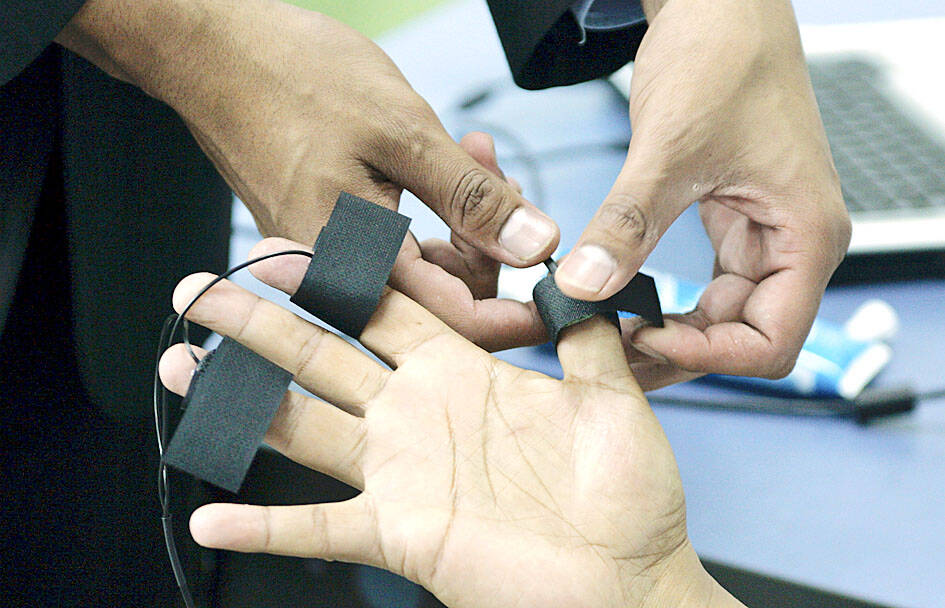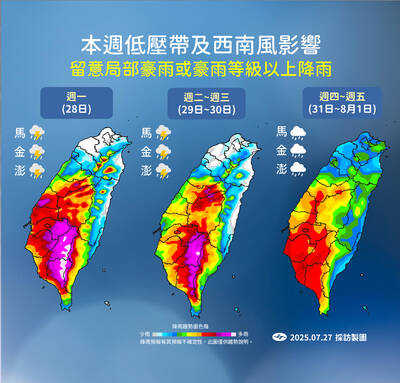The military is considering using polygraph tests in security clearance reviews if the person’s status is still in doubt after an examination, written explanation and interview, the Ministry of National Defense said yesterday.
The ministry proposed the amendment to the Operational Regulations for Verification and Use of Armed Forces Personnel Data (國軍人事資料查核運用作業規定) given the rise in espionage cases involving retired and active-duty military personnel.
A new article would be added to require newly appointed defense security affairs personnel to be vetted, particularly regarding their nationalities and criminal records.

Photo: AP
Military officers handling confidential information would be asked to fill out a special verification checklist and participate in an in-person interview.
The checklist contains 32 items in six major categories, including the legal basis for data disclosure, Military Security Division Director Chien Ying-hung (簡熒宏) told a news conference.
“If there are still questions regarding an officer’s qualifications after we review the checklist, we would ask them to turn in a written report and conduct an in-person interview. However, if they are still perceived as not giving truthful answers, further assessments would be conducted using lie detectors,” Chien said.
The devices to be used would be the same as those used by the National Security Bureau, the Criminal Investigation Bureau and the Ministry of Justice Investigation Bureau, he added.
Those who refuse to take a lie detector test would not be able to complete the security investigation and would not be qualified to handle confidential information, the amendment says.
Another new article would stipulate that personnel who are to be assigned to “secret” or “confidential” posts must undergo verification 30 days before transfer, while those slated for “top secret” or “absolute secret” posts must go through a security check 60 days in advance.
If the investigation determines that a person is not subject to any restriction criteria, their clearance remains valid for three years. However, if it finds they do — or if the they refuse to complete a special verification check — they would not be eligible for declassification and may not access state secrets, military secrets or national defense secrets. They would also be prohibited from assuming sensitive positions.
A person under investigation must provide the following: household registration for the past three months, a personal credit report and their most recent individual tax return. They must also agree to in-person interviews, inquiries of their relatives and friends, and character verification, including assessing the applicant’s personality, honesty, reliability, trustworthiness and loyalty to the state.

The Central Weather Administration (CWA) today issued a "tsunami watch" alert after a magnitude 8.7 earthquake struck off the Kamchatka Peninsula in northeastern Russia earlier in the morning. The quake struck off the east coast of the Kamchatka Peninsula at 7:25am (Taiwan time) at a depth of about 19km, the CWA said, citing figures from the Pacific Tsunami Warning Center. The CWA's Seismological Center said preliminary assessments indicate that a tsunami could reach Taiwan's coastal areas by 1:18pm today. The CWA urged residents along the coast to stay alert and take necessary precautions as waves as high as 1m could hit the southeastern

The National Museum of Taiwan Literature is next month to hold an exhibition in Osaka, Japan, showcasing the rich and unique history of Taiwanese folklore and literature. The exhibition, which is to run from Aug. 10 to Aug. 20 at the city’s Central Public Hall, is part of the “We Taiwan” at Expo 2025 series, highlighting Taiwan’s cultural ties with the international community, National Museum of Taiwan Literature director Chen Ying-fang (陳瑩芳) said. Folklore and literature, among Taiwan’s richest cultural heritages, naturally deserve a central place in the global dialogue, Chen said. Taiwan’s folklore would be immediately apparent at the entrance of the

Speeding and badly maintained roads were the main causes of a school bus accident on a rainy day in Taipei last year that severely injured two people and left 22 with minor injuries, the Taiwan Transportation and Safety Board said. On March 11 last year, a Kang Chiao International School bus overturned inside the Wenshan Tunnel (文山隧道) on the northbound lane of the Xinyi Expressway. The tour bus, owned by Long Lai Co, exceeded the speed limit after entering the tunnel, the board’s investigation found. Sensing that the rear of the vehicle was swaying, the driver attempted to use the service and exhaust

Central and southern Taiwan are to see increasingly heavy rainfall from last night through Friday due to the effects of a low-pressure system and southwesterly winds, the Central Weather Administration (CWA) said. CWA forecaster Liu Pei-teng (劉沛滕) said Tropical Storm Co-May had weakened into a low-pressure system on Saturday, but that it strengthened again into a tropical depression (TD 11) near the seas around Japan's Ryukyu Islands due to favorable environmental conditions. The tropical depression is expected to persist for two to three days, moving west-northwest by this afternoon and reaching China's Zhejiang through the East China Sea tomorrow,